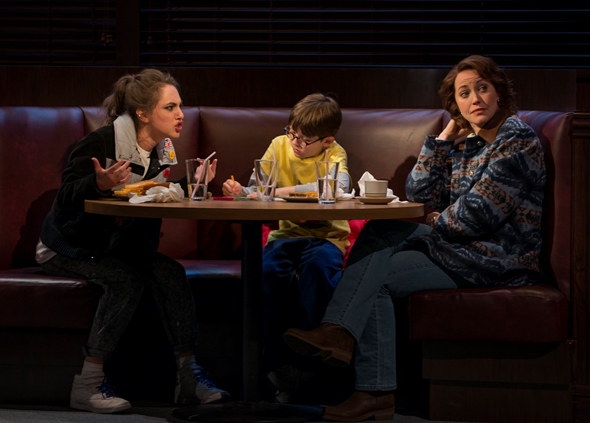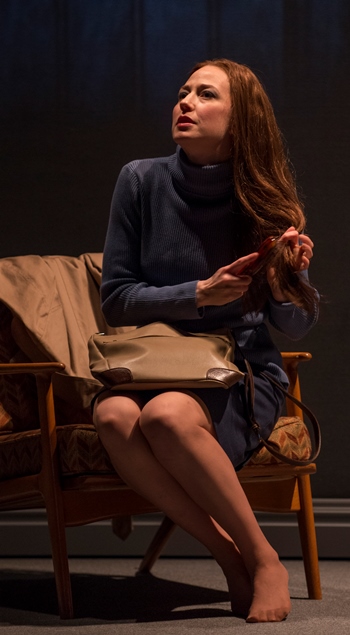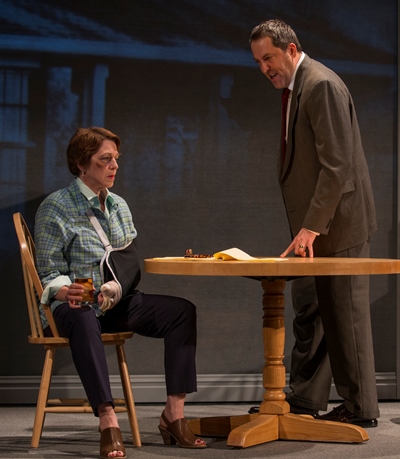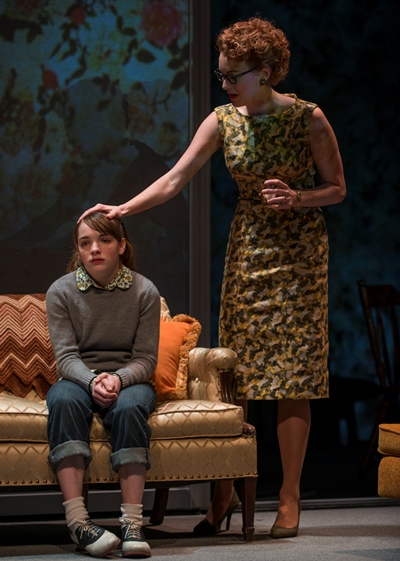‘Mary Page Marlowe’ at Steppenwolf: In Letts’ new play, woman adrift searches for an anchor
 Review: “Mary Page Marlowe” by Tracy Letts, world premiere at Steppenwolf Theatre, extended through June 5. ★★★★★
Review: “Mary Page Marlowe” by Tracy Letts, world premiere at Steppenwolf Theatre, extended through June 5. ★★★★★
By Lawrence B. Johnson
It was a happy announcement for a theater company, but happier still for any theater buff within driving distance of Chicago: Steppenwolf’s decision to extend the run of Tracy Letts’ psychologically incisive and finely crafted new play “Mary Page Marlowe.”
This brilliant existential portrait of a woman out of touch with herself, lost to the world, and seemingly condemned to her lot from birth, bears a qualitative stamp worthy of “August: Osage County,” which brought Letts the 2008 Pulitzer Prize for Drama.
 Who is Mary Page Marlowe? The difficulty of answering that question, even for the character herself, is reflected in the playwright’s choice to have her played not by one actor but rather by six.
Who is Mary Page Marlowe? The difficulty of answering that question, even for the character herself, is reflected in the playwright’s choice to have her played not by one actor but rather by six.
In part, but only in part, these cameo portraits within the big picture of Mary Page Marlowe’s life allow us to see her at various ages, from childhood through college and motherhood to middle age and into her twilight years. And the multiplicity of actors makes it easy for the playwright to leap across time, both back and forward, as we observe the pitch and yaw of her life, the crazy and desperate caroming of a woman never quite in balance.
Yet the more telling implication of six actors playing one character is the ambiguity of who she really is. Up to a certain point, late in her life, Mary Page would not be able to tell you. She is a terrified soul, unmoored and profoundly insecure, in a fun-house full of mirrors that appear to reflect real life. She plunges inexorably into alcoholism and the destruction that comes with it. She goes through three husbands and sleeps around. Her sexual liberality, she says, assures her of being noticed.
Which takes us back to her childhood, though that is not where the play begins.
No, we first meet Mary Page at a diner. The mother of a teenage daughter and an adolescent son, she’s about to inform the kids that she and their father are splitting up. This is Mary Page yielding to the disappointment of middle-age, sad and vulnerable in the radiant person of Rebecca Spence. She stands on the emotional cusp, mature and adrift and about to sink.
 She is Everywoman, blasted into the world some forty years ago, the child of a military veteran traumatized by combat and a mother left to make the best of a bad situation. The short of it is that Mom could not scrape together enough of the basic stuff – affection, self-confidence, optimism, purpose – to equip Mary Page for her life’s journey. Caroline Heffernan plays the neglected girl of 12, Annie Munch the briefly hopeful collegian.
She is Everywoman, blasted into the world some forty years ago, the child of a military veteran traumatized by combat and a mother left to make the best of a bad situation. The short of it is that Mom could not scrape together enough of the basic stuff – affection, self-confidence, optimism, purpose – to equip Mary Page for her life’s journey. Caroline Heffernan plays the neglected girl of 12, Annie Munch the briefly hopeful collegian.
But we sense our reference point in Carrie Coon’s desolate woman in her sexual prime, passing out her favors with random indifference, for a few minutes of something resembling warmth. And at virtually the same time we see where it’s all headed: Mary Page in her imploding forties (Spence) – and then, at 50 (Laura T. Fisher), as booze sends her into a life-shattering spin observed helplessly, as if from afar, by her second husband (Ian Barford), who actually loves her. Now Mary Page is staring at serious repercussions, a stiff due-bill for a life tragically misspent. And to her husband’s dismay, she eagerly embraces her comeuppance, her penance.
 Yet, ultimately, “Mary Page Marlowe” proves to be the furthest thing from a play about the damned who are allowed no exit. Not only does this errant soul find redemption in the wisdom of age (a serene Blair Brown as the gray-haired woman) and a third marriage she genuinely values. Her absolution is twofold: In her daughter (a spunky, empathic performance by Madeline Weinstein), the cycle of self-destruction is broken. Letts’ dark drama is indeed a testament to the resilience and ascendancy of the human spirit, the extraordinary grace within reach of ordinary people.
Yet, ultimately, “Mary Page Marlowe” proves to be the furthest thing from a play about the damned who are allowed no exit. Not only does this errant soul find redemption in the wisdom of age (a serene Blair Brown as the gray-haired woman) and a third marriage she genuinely values. Her absolution is twofold: In her daughter (a spunky, empathic performance by Madeline Weinstein), the cycle of self-destruction is broken. Letts’ dark drama is indeed a testament to the resilience and ascendancy of the human spirit, the extraordinary grace within reach of ordinary people.
Director Anna D. Shapiro, who this season became Steppenwolf’s artistic director, moves the subdivided story forward with seamless ease, carefully raising the poignancy quotient from one episode to the next. And Todd Rosenthal’s efficiently changeable sets underscore each shifting circumstance without encumbering the dramatic line. It’s a theatrical experience that keeps you hanging on through pained amazement — to a final release as plausible as it is welcome.
Related Links:
- Performance location, dates and times: Details at TheatreinChicago.com
- Preview of Steppenwolf Theatre’s complete 2015-16 season: Read it at ChicagoOntheAisle.com
Tags: Anna D. Shapiro, Annie Munch, Blair Brown, Caroline Heffernan, Carrie Coon, Ian Barford, Laura T. Fisher, Mary Page Marlowe, Rebecca Spence, Steppenwolf Theatre, Todd Rosenthal, Tracy Letts

